Mark, My Words. *mark Brings Me My Dictionary* Thank You Mark
mark, my words. *mark brings me my dictionary* thank you mark
More Posts from Sanyairana and Others


This is a summary of college only using two pictures; expensive as hell.
That’s my Sociology “book”. In fact what it is is a piece of paper with codes written on it to allow me to access an electronic version of a book. I was told by my professor that I could not buy any other paperback version, or use another code, so I was left with no option other than buying a piece of paper for over $200. Best part about all this is my professor wrote the books; there’s something hilariously sadistic about that. So I pretty much doled out $200 for a current edition of an online textbook that is no different than an older, paperback edition of the same book for $5; yeah, I checked. My mistake for listening to my professor.
This is why we download.
Alternatives to buying overpriced textbooks
Textbooknova
Bookboon
Textbookrevolution
GaTech Math Textbooks
Ebookee
Freebookspot
Free-ebooks
Getfreeebooks
BookFinder
Oerconsortium
Project Gutenberg
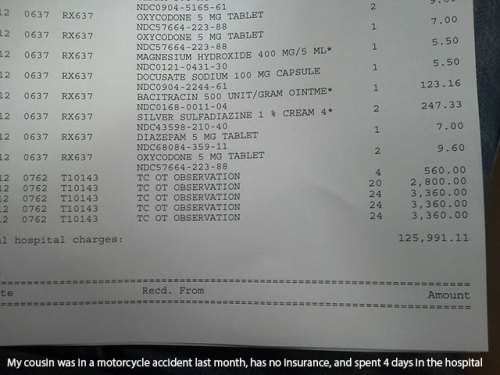
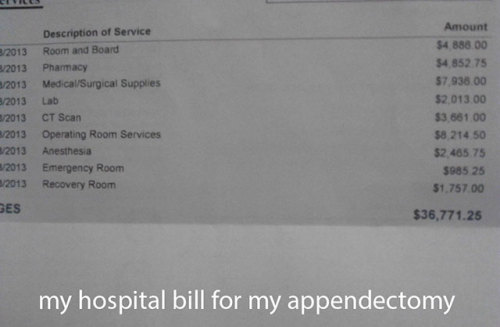


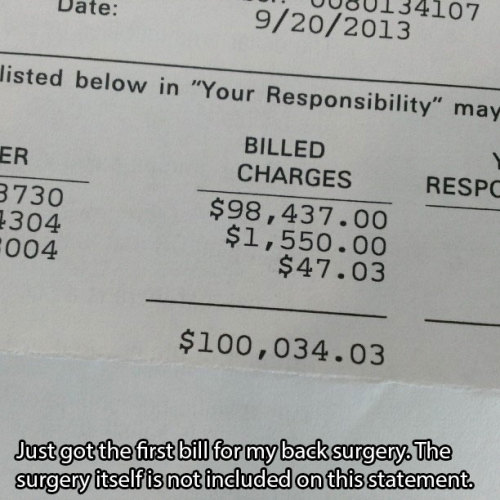


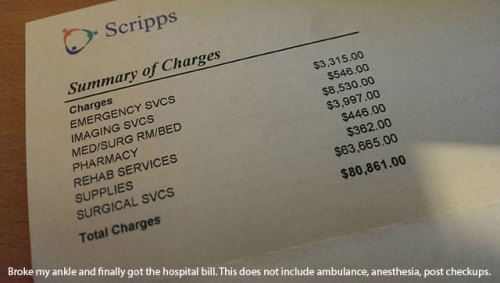
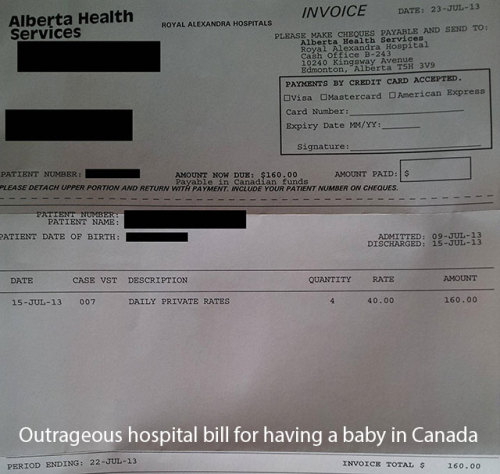
And This Is Why You Shouldn’t Get Sick In America
Many believe that the US healthcare system is the best in the world. Not so according to the World Health Organization’s ranking of the world’s health systems. The US doesn’t even rank in the top 25. It ranks 37th and is the most expensive in the world. I would argue that even if we had the best healthcare system in the world, what good is it, if no one can afford to access it.
Most companies are buying 60/40-policys for their employees these days, but even if you are lucky enough to have good insurance with 80/20-policy coverage, that 20 percent your responsible for can drive you right into bankruptcy as easily as the 60-40 policy given the cost of healthcare.
Insurance cost have been going up dramatically in the last two decades, long before the new Affordable Healthcare Act has taken affect, in some cases as much as 35% per year.
But have you noticed the latest trick the insurance companies have roll out?
Yes, Higher Deductible… most averaging $5,000 per year, per person, but I have seen some as high as $10,000 per year. For those of you that are wondering, this tactic is specifically designed too stop you from using your insurance. It reduces the insurance companies out of pocket liability by shift costs onto consumers, especially those dealing with chronic illness such as diabetes and arthritis. Consequently, because consumers can’t afford the deductible they will avoid necessary care to save money.
Although insurance companies are a problem, the real crook is the healthcare system it self. A corrupt and bloated system desperately in need of reform!
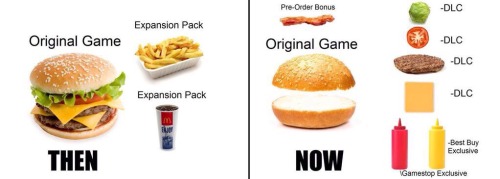

//Absurdly helpful for people writing royal characters and/or characters who interact with royalty and members of the nobility.
[x]
Just watch it.

Do you ever wonder how much you exist in other people’s lives? I’m always curious if people think of me when a certain song comes on, or when they pass through a certain town. I wonder how many stories I’ve been a part of that I may have forgotten. I wonder if I still I exist in the minds of people that I don’t speak to anymore. I wonder how many times a day I pass through someone’s head.
Here’s my life. My husband and I get up each morning at 7 o’clock and he showers while I make coffee. By the time he’s dressed I’m already sitting at my desk writing. He kisses me goodbye then leaves for the job where he makes good money, draws excellent benefits and gets many perks, such as travel, catered lunches and full reimbursement for the gym where I attend yoga midday. His career has allowed me to work only sporadically, as a consultant, in a field I enjoy. All that disclosure is crass, I know. I’m sorry. Because in this world where women will sit around discussing the various topiary shapes of their bikini waxes, the conversation about money (or privilege) is the one we never have. Why? I think it’s the Marie Antoinette syndrome: Those with privilege and luck don’t want the riffraff knowing the details. After all, if “those people” understood the differences in our lives, they might revolt. Or, God forbid, not see us as somehow more special, talented and/or deserving than them. There’s a special version of this masquerade that we writers put on. Two examples: I attended a packed reading (I’m talking 300+ people) about a year and a half ago. The author was very well-known, a magnificent nonfictionist who has, deservedly, won several big awards. He also happens to be the heir to a mammoth fortune. Mega-millions. In other words he’s a man who has never had to work one job, much less two. He has several children; I know, because they were at the reading with him, all lined up. I heard someone say they were all traveling with him, plus two nannies, on his worldwide tour. None of this takes away from his brilliance. Yet, when an audience member — young, wide-eyed, clearly not clued in — rose to ask him how he’d managed to spend 10 years writing his current masterpiece — What had he done to sustain himself and his family during that time? — he told her in a serious tone that it had been tough but he’d written a number of magazine articles to get by. I heard a titter pass through the half of the audience that knew the truth. But the author, impassive, moved on and left this woman thinking he’d supported his Manhattan life for a decade with a handful of pieces in the Nation and Salon. Example two. A reading in a different city, featuring a 30-ish woman whose debut novel had just appeared on the front page of the New York Times Book Review. I didn’t love the book (a coming-of-age story set among wealthy teenagers) but many people I respect thought it was great, so I defer. The author had herself attended one of the big, East Coast prep schools, while her parents were busy growing their careers on the New York literary scene. These were people — her parents — who traded Christmas cards with William Maxwell and had the Styrons over for dinner. She, the author, was their only beloved child. After prep school, she’d earned two creative writing degrees (Iowa plus an Ivy). Her first book was being heralded by editors and reviewers all over the country, many of whom had watched her grow up. It was a phenomenon even before it hit bookshelves. She was an immediate star. When (again) an audience member, clearly an undergrad, rose to ask this glamorous writer to what she attributed her success, the woman paused, then said that she had worked very, very hard and she’d had some good training, but she thought in looking back it was her decision never to have children that had allowed her to become a true artist. If you have kids, she explained to the group of desperate nubile writers, you have to choose between them and your writing. Keep it pure. Don’t let yourself be distracted by a baby’s cry. I was dumbfounded. I wanted to leap to my feet and shout. “Hello? Alice Munro! Doris Lessing! Joan Didion!” Of course, there are thousands of other extraordinary writers who managed to produce art despite motherhood. But the essential point was that, the quality of her book notwithstanding, this author’s chief advantage had nothing to do with her reproductive decisions. It was about connections. Straight up. She’d had them since birth. In my opinion, we do an enormous “let them eat cake” disservice to our community when we obfuscate the circumstances that help us write, publish and in some way succeed. I can’t claim the wealth of the first author (not even close); nor do I have the connections of the second. I don’t have their fame either. But I do have a huge advantage over the writer who is living paycheck to paycheck, or lonely and isolated, or dealing with a medical condition, or working a full-time job. How can I be so sure? Because I used to be poor, overworked and overwhelmed. And I produced zero books during that time. Throughout my 20s, I was married to an addict who tried valiantly (but failed, over and over) to stay straight. We had three children, one with autism, and lived in poverty for a long, wretched time. In my 30s I divorced the man because it was the only way out of constant crisis. For the next 10 years, I worked two jobs and raised my three kids alone, without child support or the involvement of their dad. I published my first novel at 39, but only after a teaching stint where I met some influential writers and three months living with my parents while I completed the first draft. After turning in that manuscript, I landed a pretty cushy magazine editor’s job. A year later, I met my second husband. For the first time I had a true partner, someone I could rely on who was there in every way for me and our kids. Life got easier. I produced a nonfiction book, a second novel and about 30 essays within a relatively short time. Today, I am essentially “sponsored” by this very loving man who shows up at the end of the day, asks me how the writing went, pours me a glass of wine, then takes me out to eat. He accompanies me when I travel 500 miles to do a 75-minute reading, manages my finances, and never complains that my dark, heady little books have resulted in low advances and rather modest sales. I completed my third novel in eight months flat. I started the book while on a lovely vacation. Then I wrote happily and relatively quickly because I had the time and the funding, as well as help from my husband, my agent and a very talented editor friend. Without all those advantages, I might be on page 52. OK, there’s mine. Now show me yours.
Ann Bauer, ““Sponsored” by my husband: Why it’s a problem that writers never talk about where their money comes from”, http://www.salon.com/2015/01/25/sponsored_by_my_husband_why_its_a_problem_that_writers_never_talk_about_where_their_money_comes_from/ (via angrygirlcomics)
This is so important, especially for people like me, who are always hearing the radio station that plays “but you’re 26 and you are ~*~gifted~*~ and you can write, WHERE IS YOUR NOVEL” on constant loop.
It’s so important because I see younger people who can write going “oh yes, I can write, therefore I will be an English major, and write my book and live on that yes?? then I don’t have to do other jobs yes??” and you’re like “oh, no, honey, at least try to add another string to your bow, please believe that it will not happen quite like that”
It’s so important not to be overly impressed by Walden because Thoreau’s mother continued to cook him food and wash his laundry while he was doing his self-sufficient wilderness-experiment “sit in a cabin and write” thing.
It’s so important because when you’re impressed by Lord of the Rings, remember that Tolkien had servants, a wife, university scouts and various underlings to do his admin, cook his meals, chase after him, and generally set up his life so that the only thing he had to do was wander around being vague and clever. In fact, the man could barely stand to show up at his own day job.
It’s important when you look at published fiction to remember that it is a non-random sample, and that it’s usually produced by the leisure class, so that most of what you study and consume is essentially wolves in captivity - not wolves in the wild - and does not reflect the experiences of all wolves.
Yeah. Important. Like that.
(via elodieunderglass)
Russell Brand discusses Iggy Azalea and the appropriation of black culture (watch the full interview here)
“Hasn’t that always been the way with mainstream culture? Whether it’s the blues or rock n’ roll [or hip hop]. The re-appropriation of black culture into the mainstream? That’s always been the way. It becomes sanitized. It loses its original message without ever conceding any rights to non-white people. Take the best bits. Keep the fruit. And abandon the people.”
“The idea that black culture is constantly being ransacked is a powerful narrative, a powerful story that began with slavery, one of the great abominations of human history. That injury hasn’t been healed. The civil rights struggle is only 50 years ago and still racism is a prevalent issue in this country and all over the world.”
-
 skullkidy liked this · 4 weeks ago
skullkidy liked this · 4 weeks ago -
 emci123 reblogged this · 4 weeks ago
emci123 reblogged this · 4 weeks ago -
 emci123 liked this · 4 weeks ago
emci123 liked this · 4 weeks ago -
 ruegoreos liked this · 4 weeks ago
ruegoreos liked this · 4 weeks ago -
 princetea liked this · 4 weeks ago
princetea liked this · 4 weeks ago -
 vellumpaperairplane liked this · 4 weeks ago
vellumpaperairplane liked this · 4 weeks ago -
 g4l4xy-qu33n reblogged this · 4 weeks ago
g4l4xy-qu33n reblogged this · 4 weeks ago -
 g4l4xy-qu33n liked this · 4 weeks ago
g4l4xy-qu33n liked this · 4 weeks ago -
 drummer-from-down-under liked this · 4 weeks ago
drummer-from-down-under liked this · 4 weeks ago -
 lixel-5 liked this · 4 weeks ago
lixel-5 liked this · 4 weeks ago -
 lagodeluna liked this · 4 weeks ago
lagodeluna liked this · 4 weeks ago -
 callixton liked this · 4 weeks ago
callixton liked this · 4 weeks ago -
 6vaguebook reblogged this · 4 weeks ago
6vaguebook reblogged this · 4 weeks ago -
 fortyseventhbluepen reblogged this · 4 weeks ago
fortyseventhbluepen reblogged this · 4 weeks ago -
 fortyseventhbluepen liked this · 4 weeks ago
fortyseventhbluepen liked this · 4 weeks ago -
 eltingvilleocxcanon liked this · 4 weeks ago
eltingvilleocxcanon liked this · 4 weeks ago -
 pepprsteak liked this · 4 weeks ago
pepprsteak liked this · 4 weeks ago -
 twacn reblogged this · 4 weeks ago
twacn reblogged this · 4 weeks ago -
 oneheadedcerberus reblogged this · 4 weeks ago
oneheadedcerberus reblogged this · 4 weeks ago -
 sawxix liked this · 4 weeks ago
sawxix liked this · 4 weeks ago -
 imawalkingdeadman reblogged this · 4 weeks ago
imawalkingdeadman reblogged this · 4 weeks ago -
 imawalkingdeadman liked this · 4 weeks ago
imawalkingdeadman liked this · 4 weeks ago -
 dinofur reblogged this · 4 weeks ago
dinofur reblogged this · 4 weeks ago -
 dinofur liked this · 4 weeks ago
dinofur liked this · 4 weeks ago -
 afoxnamedmulder reblogged this · 4 weeks ago
afoxnamedmulder reblogged this · 4 weeks ago -
 mandycore420 reblogged this · 4 weeks ago
mandycore420 reblogged this · 4 weeks ago -
 boppinbobby reblogged this · 4 weeks ago
boppinbobby reblogged this · 4 weeks ago -
 lilys-re-blog reblogged this · 4 weeks ago
lilys-re-blog reblogged this · 4 weeks ago -
 unhinged4her liked this · 4 weeks ago
unhinged4her liked this · 4 weeks ago -
 chaotickyri reblogged this · 4 weeks ago
chaotickyri reblogged this · 4 weeks ago -
 chaotickyri liked this · 4 weeks ago
chaotickyri liked this · 4 weeks ago -
 clownboybeebop reblogged this · 4 weeks ago
clownboybeebop reblogged this · 4 weeks ago -
 ghoulzlovez liked this · 4 weeks ago
ghoulzlovez liked this · 4 weeks ago -
 vanillasyrup reblogged this · 4 weeks ago
vanillasyrup reblogged this · 4 weeks ago -
 alastairheir liked this · 4 weeks ago
alastairheir liked this · 4 weeks ago -
 marquis-de-lafayette57 liked this · 4 weeks ago
marquis-de-lafayette57 liked this · 4 weeks ago -
 k1tkatzzz liked this · 4 weeks ago
k1tkatzzz liked this · 4 weeks ago -
 hawaiianshirttaco64 reblogged this · 4 weeks ago
hawaiianshirttaco64 reblogged this · 4 weeks ago -
 hawaiianshirttaco64 liked this · 4 weeks ago
hawaiianshirttaco64 liked this · 4 weeks ago -
 battleteacake reblogged this · 4 weeks ago
battleteacake reblogged this · 4 weeks ago -
 battleteacake liked this · 4 weeks ago
battleteacake liked this · 4 weeks ago -
 pitchblackveins reblogged this · 4 weeks ago
pitchblackveins reblogged this · 4 weeks ago -
 litttlebugman reblogged this · 4 weeks ago
litttlebugman reblogged this · 4 weeks ago -
 not-a-boot reblogged this · 4 weeks ago
not-a-boot reblogged this · 4 weeks ago -
 not-a-boot liked this · 4 weeks ago
not-a-boot liked this · 4 weeks ago -
 duke-is-the-shit liked this · 4 weeks ago
duke-is-the-shit liked this · 4 weeks ago -
 colby-acheesehater reblogged this · 4 weeks ago
colby-acheesehater reblogged this · 4 weeks ago -
 that-was-a-bit-stupid-of-you reblogged this · 4 weeks ago
that-was-a-bit-stupid-of-you reblogged this · 4 weeks ago -
 that-was-a-bit-stupid-of-you liked this · 4 weeks ago
that-was-a-bit-stupid-of-you liked this · 4 weeks ago -
 micromegazz liked this · 4 weeks ago
micromegazz liked this · 4 weeks ago


